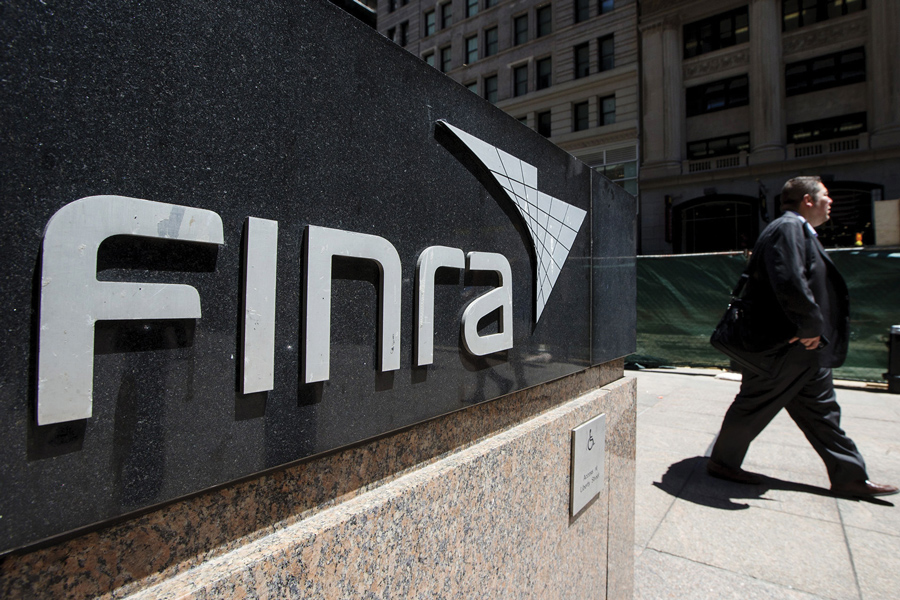

A Finra proposal to rein in brokerages that have a history of violations or hire a number of registered representatives with disciplinary actions has drawn criticism for not going far enough to curb rogue brokers.
Under the measure, which the Financial Industry Regulatory Authority Inc. first released in May 2019, the broker-dealer self-regulator would use numeric thresholds for regulatory disclosures to identify firms that pose a heightened risk to investors. Those “restricted firms” would be required to deposit money into an account controlled by Finra that could be used to fund arbitration awards and for other purposes.
“Finra believes that the direct financial impact of a restricted deposit is most likely to change such member firms’ behavior—and therefore protect investors,” the proposal states. “An added benefit of this proposal would be to preserve member firm funds for payment of arbitration awards against them and their associated persons. The proposal would consider [arbitration claims] and unpaid arbitration awards in determining the size of a restricted firm’s ‘restricted deposit requirement.’”
Finra took public comments on the proposal in the summer of 2019, and later that year its board voted to send a revised proposal to the Securities and Exchange Commission. The SEC must approve Finra proposals. The agency opened its own comment period last November that concluded on Dec. 28.
Several groups asserted that the proposal is too timid to rein in rogue brokers, a problem that has vexed Finra for years.
“While the proposal—trying to minimally regulate firms that specialize in recidivist brokers by making it a little costlier for them to operate—is arguably better than doing nothing, it is nonetheless grossly insufficient and doomed to fail to achieve the purported [Finra] objectives,” Lev Bagramian, senior securities policy advisor at Better Markets Inc., and Michael Hughes, a program assistant, wrote in a Dec. 28 comment letter.
“The harm caused by recidivist wolf-pack firms is crystal clear, and the solution is elegantly simple: de-licensing, barring, and cleaning up the ranks of the brokerage industry of members that choose to sell obviously unsuitable products, cheat, defraud, and harm countless victims and rob them off of their future financial security,” the Better Markets letter states.
The Public Investors Advocate Bar Association said the proposal is a step in the right direction but doesn’t go far enough.
“The proposed measures do not do nearly enough to discourage bad actors from engaging in misconduct nor purge the securities industry of member firms and brokers with a history of misconduct that, by FINRA’s own admission, may be predictive of future misconduct,” David P. Meyer, PIABA president, wrote in a Dec. 28 comment letter. “Further, while the proposed rule allows Finra to consider outstanding unpaid arbitration awards and settlements as criteria when designating a firm as a restricted firm, the rule fails to establish a remedy, such as…requiring these outstanding debts to be paid by the firm prior to depositing funds into a restricted deposit account to cover future obligations, which could preclude the need to consider such criteria in the first place.”
The Securities Industry and Financial Markets Association supports the proposal but said that Finra should be more transparent in how it determines which firms are restricted.
“We believe it is critical that firms have an independent mechanism to replicate Finra’s calculation,” Kevin Carroll, SIFMA managing director and associate general counsel, wrote in a Dec. 29 comment letter. “It would allow firms to self-monitor and self-correct.”
State regulators told the SEC that restricted firms should be publicly identified, a move that is not included in the proposal.
“Requiring public disclosure of this information would be consistent with other disclosure rules discussed below and would allow investors to make informed decisions regarding the individuals and firms with whom they do business,” Lisa Hopkins, West Virginia deputy securities director and president of the North American Securities Administrators Association, wrote in a Dec. 28 comment letter.
The SEC could approve the proposal or modify it and possibly seek further comment. The timeline is unclear.

After a two-year period of inversion, the muni yield curve is back in a more natural position – and poised to create opportunities for long-term investors.

Meanwhile, an experienced Connecticut advisor has cut ties with Edelman Financial Engines, and Raymond James' independent division welcomes a Washington-based duo.

Osaic has now paid $17.2 million to settle claims involving former clients of Jim Walesa.

Oregon-based Eagle Wealth Management and Idaho-based West Oak Capital give Mercer 11 acquisitions in 2025, matching last year's total. “We think there's a great opportunity in the Pacific Northwest,” Mercer's Martine Lellis told InvestmentNews.

Osaic-owned CW Advisors has added more than $500 million to reach $14.5 billion in AUM, while Apella's latest deal brings more than $1 billion in new client assets.
Orion's Tom Wilson on delivering coordinated, high-touch service in a world where returns alone no longer set you apart.
Barely a decade old, registered index-linked annuities have quickly surged in popularity, thanks to their unique blend of protection and growth potential—an appealing option for investors looking to chart a steadier course through today's choppy market waters, says Myles Lambert, Brighthouse Financial.
